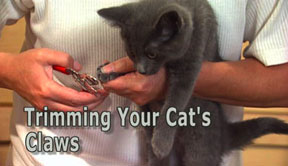Anxious about your cat's health? Vet College online videos dispel the fears and confusion of administering to your pet
By Krishna Ramanujan


Anxious pet owners often wish they knew the best way to trim their cat's claws, brush their cat's teeth or give their diabetic cat insulin injections. Now they can relax. A new educational program, Partners in Animal Health, is offering state-of-the-art videos with 3-D animations on a variety of pet-care topics.
The streaming videos, created in partnership with the Cornell Feline Health Center at Cornell's College of Veterinary Medicine, are freely available online at http://www.felinevideos.vet.cornell.edu/index.shtml (but they do require a downloadable Macromedia Flash Player). In coming months they will be offered for sale on DVD through the Web site.
The video series on how to care for a cat with diabetes follows a pet owner through the process of getting the diagnosis, understanding the condition and overcoming anxiety and confusion about the disease. It also offers step-by-step instructions on how to administer an insulin injection and monitor the cat at home and feed the animal properly to control diabetes.
"A big problem is getting owners to overcome their fear of giving insulin injections," said Jodi Korich, a veterinarian and director of the Partners in Animal Health Program. "They think, 'I can't do this,' but these videos show them how simple it really is, and that means more cats will survive this very common disease."
Other basic cat-care videos in the collection provide detailed instructions on giving medications, taking temperature and training to accept tooth brushing.
More disease-related videos are on the way, including one explaining the needs of dogs and cats with cancer. The videos will discuss how pets develop cancer, cancer prevention and the importance of early detection, and treatment options.
"The response from the public has been tremendous," said Terry Kristensen, associate director of the Flower-Sprecher Veterinary Library, who assists in running the program. "We've received many thank-you letters from pet owners explaining how the videos changed their lives."
Busy veterinarians also find the videos invaluable, said Korich, because they can refer pet owners to online tools that come from a trusted source of information.
For students and practicing veterinarians, the program offers a growing number of instructional videos and online reference tools as well.
The program, which began two years ago, plans to push the envelope in the use of multimedia Internet learning, said Kristensen. "We see this as becoming an absolutely integral part of the way people learn," she said.
Accessing more technical videos intended for students and veterinarians requires registration at http://w3.vet.cornell.edu/virtualvet.
The Partners in Animal Health Program is sponsored by the College of Veterinary Medicine's Department of Clinical Sciences and the veterinary library and is funded in part by Nestle Purina and Heska Corp.
Media Contact
Get Cornell news delivered right to your inbox.
Subscribe